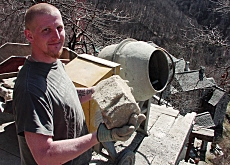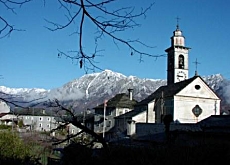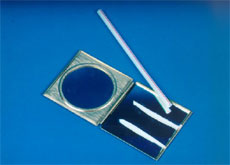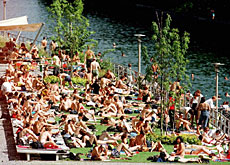Addicts reconstruct villages and their lives

"It might be hard and you might want to give up at times but in the end you've got a house that can be lived in, and you've built it with your own two hands."
This is the answer of Luke Fazzard to the question whether he sees any parallels between his attempt to put his life back together and the reconstruction of the alpine village, Bordei.
Tall and thin with closely cropped hair, the 24-year-old began therapy in Bordei at the beginning of the year. He checked-in to the rehabilitation centre suffering from cannabis and alcohol abuse that started at the impressionable age of 14.
There are several therapeutic centres across Switzerland for people like Fazzard whose substance abuse turned them into social outcasts or led to psychological problems. But what sets Bordei – run by the Terra Vecchia Foundation – apart is the unique contribution it enables patients to make to the preservation of Switzerland’s cultural heritage.
It all started more than 30 years ago when a couple of idealistic Swiss-Germans stumbled upon an abandoned hamlet, Terra Vecchia, in the Centovalli region of Italian-speaking canton Ticino.
Their goal was to restore the collection of dilapidated stone houses, and they eventually struck upon the idea to involve troubled youth, to provide them with “inspiration and the experience of living in a community”.
The project first took root in the neighbouring village of Bordei, which still counted a few inhabitants and was therefore less of a ruin.
Aided by counsellors and skilled craftsmen, the youth – now mainly young adults treated for substance abuse – were able to complete the village restoration. The project has received awards and accolades from London’s Conservation Foundation and Brussels’s Rotthier prize for architecture, among others.
Stone by stone
While still maintaining Bordei and working its fields, the young adults, including Dave Cato, have also been aiding in the reconstruction, stone by stone, of the houses at the original site, Terra Vecchia.
“I had a good job with a good company, and they wanted to extend my contract but in the end I had to say ‘sorry, I’ve got to sort myself out first before I work again’,” explains the 29-year-old, who came to the centre after suffering a heroin overdose.
A machinist by trade, Cato travels each day from Bordei to Terra Vecchia aboard the open cable car connecting the two hamlets across a deep gorge.
“You always think you’re on your own, and nobody wants anything to do with you,” he says, sitting in front of the painstakingly restored 17th century church. “Being up here being able to talk to others about your situation helps. We help each other.”
The very isolation of Bordei and Terra Vecchia led to their downfall as inhabitants fled in search of work in the lowlands or abroad, but their seclusion is what makes them attractive today.
“The reason I chose to come here is because it’s far from where I live and the language is different which makes it difficult to get drugs again. I also love being in the mountains,” says Cato.
Not all work
Life at the centre is not all work. Cato and his colleagues are provided with professional counselling, take part in group therapy sessions, learn crafts, and are offered language courses.
“They are given the chance to get back into a weekly routine, which includes a re-introduction into the working world,” says Martin Arnold, head of the centre. “Some are doing work for the first time in their lives, and it’s our aim to provide them with stability so they can continue on this path once they have left Bordei.”
Arnold says not all of the youth see the parallels between putting their lives back on track and the reconstruction efforts, but the “meaningful” work they do helps them reach their goal.
He says about two-thirds of former patients have been able to stay clean and lead normal lives again.
“It’s calmed me down quite a lot,” reflects Cato, who plans to leave in August after 12 months. “It’s made me think about what I should be doing and how I should carry on in life.”
“I was living like a zombie and feeling like one as well,” says Fazzard, taking a break from splitting firewood. “I used to take a long time to answer questions, and I may still do now, but my reactions have become much faster.”
“Some people when they come here only see that it’s isolated and far from home which they don’t like,” adds Arnold. “But we receive a lot of positive feedback from former patients, who agree that taking part in the village reconstruction taught them something about themselves.”
swissinfo, Dale Bechtel in Bordei
The Terra Vecchia Foundation was started in the early 1970s in the canton Ticino hamlet of Bordei, offering therapy for troubled youth.
It now consists of about ten rehabilitation centres – mostly in canton Bern – for drug addicts, people suffering psychological distress, and the long-term unemployed.
For centuries, it was difficult making ends meet in Ticino’s mountain valleys by working the land alone, so men from were forced to migrate in search of jobs.
Those of Terra Vecchia (then known as Rasa) were granted a monopoly as dock porters in the Italian seaside town of Livorno.
Earning enough money to bring home, they were instrumental in the decision to start a new village on higher ground, where they constructed large houses with palatial-like interiors influenced by what they had seen in Italy.
By the early 19th century, the old village, by this time known as “Terra Vecchia” (old grounds), had been abandoned, and the new village baptised as Rasa.

In compliance with the JTI standards
More: SWI swissinfo.ch certified by the Journalism Trust Initiative













You can find an overview of ongoing debates with our journalists here . Please join us!
If you want to start a conversation about a topic raised in this article or want to report factual errors, email us at english@swissinfo.ch.